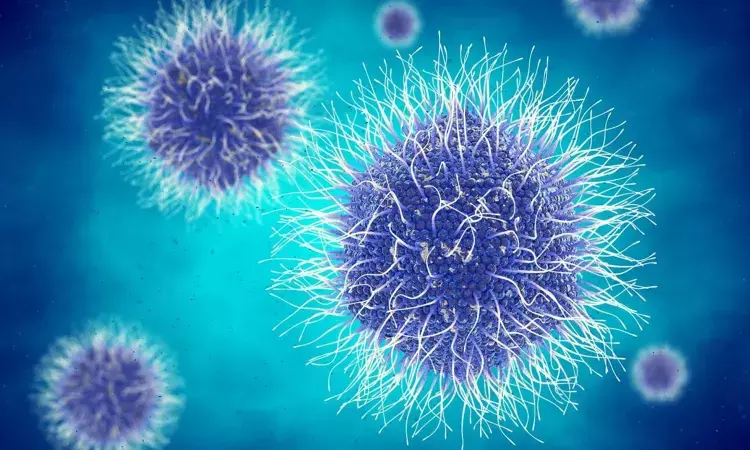- Home
- Medical news & Guidelines
- Anesthesiology
- Cardiology and CTVS
- Critical Care
- Dentistry
- Dermatology
- Diabetes and Endocrinology
- ENT
- Gastroenterology
- Medicine
- Nephrology
- Neurology
- Obstretics-Gynaecology
- Oncology
- Ophthalmology
- Orthopaedics
- Pediatrics-Neonatology
- Psychiatry
- Pulmonology
- Radiology
- Surgery
- Urology
- Laboratory Medicine
- Diet
- Nursing
- Paramedical
- Physiotherapy
- Health news
- Fact Check
- Bone Health Fact Check
- Brain Health Fact Check
- Cancer Related Fact Check
- Child Care Fact Check
- Dental and oral health fact check
- Diabetes and metabolic health fact check
- Diet and Nutrition Fact Check
- Eye and ENT Care Fact Check
- Fitness fact check
- Gut health fact check
- Heart health fact check
- Kidney health fact check
- Medical education fact check
- Men's health fact check
- Respiratory fact check
- Skin and hair care fact check
- Vaccine and Immunization fact check
- Women's health fact check
- AYUSH
- State News
- Andaman and Nicobar Islands
- Andhra Pradesh
- Arunachal Pradesh
- Assam
- Bihar
- Chandigarh
- Chattisgarh
- Dadra and Nagar Haveli
- Daman and Diu
- Delhi
- Goa
- Gujarat
- Haryana
- Himachal Pradesh
- Jammu & Kashmir
- Jharkhand
- Karnataka
- Kerala
- Ladakh
- Lakshadweep
- Madhya Pradesh
- Maharashtra
- Manipur
- Meghalaya
- Mizoram
- Nagaland
- Odisha
- Puducherry
- Punjab
- Rajasthan
- Sikkim
- Tamil Nadu
- Telangana
- Tripura
- Uttar Pradesh
- Uttrakhand
- West Bengal
- Medical Education
- Industry
COVID-19 patients may have coronavirus upto 8 days after symptoms disappear: Study

COVID-19 patients can be infectious even after their symptomatic recovery, so treat the asymptomatic/recently recovered patients as carefully as symptomatic patients."
In a new study, researchers found that half of the patients they treated for mild COVID-19 infection still had coronavirus for up to eight days after symptoms disappeared. The research letter was published online in the American Thoracic Society's American Journal of Respiratory and Critical Care Medicine.
In "Time Kinetics of Viral Clearance and Resolution of Symptoms in Novel Coronavirus Infection," Lixin Xie, MD, Lokesh Sharma, PhD, and co-authors report on a study of 16 patients with COVID-19, who were treated and released from the Treatment Center of PLA General Hospital in Beijing between January 28 and Feb. 9, 2020. Patients studied had a median age of 35.5 years.
Researchers collected samples from throat swabs taken from all patients on alternate days and analyzed. Patients were discharged after their recovery and confirmation of negative viral status by at least two consecutive polymerase chain reaction (PCR) tests.
"The most significant finding from our study is that half of the patients kept shedding the virus even after resolution of their symptoms," said co-lead author Dr. Sharma, instructor of medicine, Section of Pulmonary, Critical Care & Sleep Medicine, Department of Medicine, Yale School of Medicine. "More severe infections may have even longer shedding times."
The primary symptoms in these patients included fever, cough, pain in the pharynx (pharyngalgia) and difficult or labored breathing (dyspnea). Patients were treated with a range of medications.
The time from infection to onset of symptoms (incubation period) was five days among all but one patient. The average duration of symptoms was eight days, while the length of time patients remained contagious after the end of their symptoms ranged from one to eight days. Two patients had diabetes and one had tuberculosis, neither of which affected the timing of the course of COVID-19 infection.
"If you had mild respiratory symptoms from COVID-19 and were staying at home so as not to infect people, extend your quarantine for another two weeks after recovery to ensure that you don't infect other people," recommended corresponding author Lixin Xie, MD, professor, College of Pulmonary and Critical Care Medicine, Chinese PLA General Hospital, Beijing.
The authors had a special message for the medical community: "COVID-19 patients can be infectious even after their symptomatic recovery, so treat the asymptomatic/recently recovered patients as carefully as symptomatic patients."
The researchers emphasized that all of these patients had milder infections and recovered from the disease, and that the study looked at a small number of patients. They noted that it is unclear whether similar results would hold true for more vulnerable patients such as the elderly, those with suppressed immune systems and patients on immunosuppressive therapies.
"Further studies are needed to investigate if the real-time PCR-detected virus is capable of transmission in the later stages of COVID-19 infection," Dr. Xie added.
For more details click on the link: http://dx.doi.org/10.1164/rccm.202003-0524LE
Hina Zahid Joined Medical Dialogue in 2017 with a passion to work as a Reporter. She coordinates with various national and international journals and association and covers all the stories related to Medical guidelines, Medical Journals, rare medical surgeries as well as all the updates in the medical field. Email: editorial@medicaldialogues.in. Contact no. 011-43720751
Dr Kamal Kant Kohli-MBBS, DTCD- a chest specialist with more than 30 years of practice and a flair for writing clinical articles, Dr Kamal Kant Kohli joined Medical Dialogues as a Chief Editor of Medical News. Besides writing articles, as an editor, he proofreads and verifies all the medical content published on Medical Dialogues including those coming from journals, studies,medical conferences,guidelines etc. Email: drkohli@medicaldialogues.in. Contact no. 011-43720751


